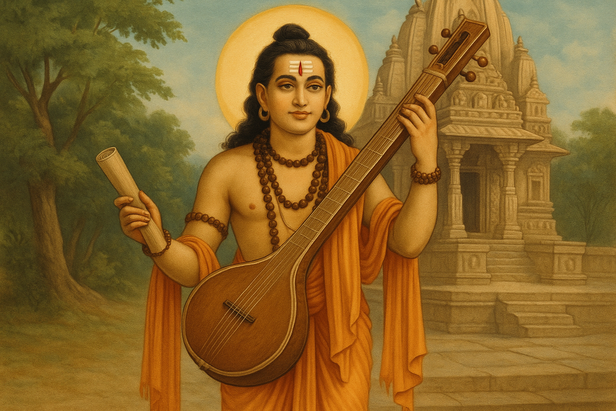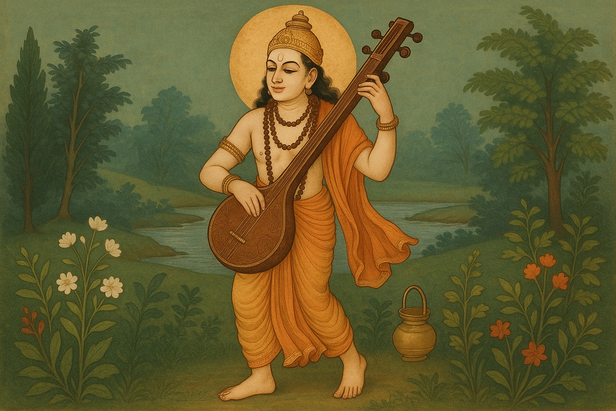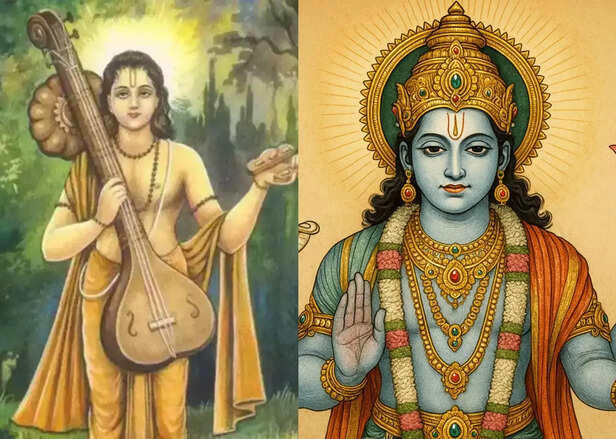
Why TV Got Narad Muni Wrong: The Untold Truth from Hindu Scriptures
When people hear the name Narad Muni, they often imagine a sage roaming with a veena, chanting “Narayan, Narayan,” and dropping into situations just to stir trouble. Television shows have long portrayed him as a comic character—a divine mischief-maker who thrives on gossip. But this simplified version hides the truth.
In the sacred scriptures of Sanatan Dharma, Narad Muni is not just a wandering sage. He is a Maharishi, a son of Lord Brahma, and one of the most revered devotees of Lord Vishnu. His story is filled with wisdom, cosmic duty, and spiritual devotion—qualities that deserve to be remembered beyond TV dramatizations.

Who Was Narad Muni According to Scriptures?
Narad Muni finds mention in many sacred texts including the Puranas, Mahabharata, and Bhagavata Purana. Far from being a meddler, he is one of the Saptarishis (seven great sages) and is known for his ability to freely travel between realms—heaven, earth, and the underworld.
His purpose was not to create conflict but to communicate divine knowledge. He acted as a messenger between gods, sages, kings, and even demons, ensuring that dharma (righteousness) prevailed. Through his travels, he spread wisdom and inspired beings to walk the spiritual path.
Narad as Vishnu’s Eternal Messenger

Television often overlooks Narad Muni’s greatest identity: his unwavering devotion to Lord Vishnu. He is celebrated as a parama-bhakta (supreme devotee) of the Lord. His constant chant, “Narayan, Narayan,” is not comic filler, but an eternal reminder of surrender to the Supreme.
Whenever dharma was threatened, Narad carried divine messages that shaped destinies. He guided devas and humans, and even demons, to follow the will of the cosmos. His role was that of a bridge—bringing wisdom from the divine realm to the mortal world.
The Deeper Purpose Behind Narad’s “Mischief”

What may appear as Narad Muni’s interference in stories often had a higher spiritual purpose. By asking sharp questions or sparking situations, he led individuals toward self-realization.
Some powerful examples include:
- Valmiki’s Transformation: Narad’s guidance helped the robber Ratnakara turn into Sage Valmiki, the composer of the Ramayana.
- Prahlad’s Devotion: Narad mentored young Prahlad, who stood firm in his faith in Vishnu despite his father Hiranyakashipu’s tyranny.
- Guidance to Kings and Sages: His counsel often looked troublesome at first but ultimately directed rulers and seekers toward the path of truth.
Thus, what seemed like “troublemaking” was actually divine orchestration to move events in line with cosmic will.
Narad as the Celestial Musician
Television rarely portrays Narad Muni’s musical greatness. He was a master of the veena and revered as the celestial musician of the gods. His music was not just entertainment—it carried spiritual vibrations that uplifted consciousness and invoked devotion.
Narad is also considered the father of bhakti sangeet (devotional music). His hymns and kirtans are believed to awaken the spirit of devotion, guiding souls closer to liberation.

Why TV Got It Wrong
Television tends to simplify characters to keep audiences entertained. In doing so, it turned Narad Muni into a light-hearted, comical sage. While this portrayal may bring smiles, it risks overshadowing his true spiritual stature.
The reality is that Narad was never merely comic relief. He was a sage, a messenger of the divine, and an eternal guide for humanity. His actions carried cosmic purpose, not comic entertainment.
Rediscovering the Real Narad Muni
Narad Muni was, and continues to be, much more than a wandering sage with amusing antics. He is a timeless seer, teacher, and saint—a bridge between the mortal and the divine. His so-called “mischief” was only a way to help beings recognize higher truths.
His eternal chant, “Narayan, Narayan,” still echoes as a reminder of surrender, devotion, and liberation. Perhaps it is time we looked beyond television portrayals and embraced the true Narad Muni—the messenger of Vishnu, the master of music, and the sage of cosmic wisdom.
🔹 FAQs for SEO
Q1. Why is Narad Muni often shown as a mischief-maker on TV?
Television simplifies Narad Muni’s image for entertainment, portraying him as comic relief. In reality, scriptures describe him as a divine sage with cosmic responsibilities.
Q2. What is Narad Muni’s role in Hindu scriptures?
He is a Maharishi, a messenger of Vishnu, and a guide who helps beings follow dharma through wisdom, music, and devotion.
Q3. Was Narad Muni really a troublemaker?
No. What seemed like mischief was actually a divine way of guiding people toward self-realization and fulfilling cosmic plans.
Q4. Why is Narad Muni called the father of devotional music?
Narad was a master of the veena and composed hymns that carried spiritual vibrations. He is considered the originator of bhakti sangeet (devotional music).
Q5. What does Narad Muni’s chant “Narayan, Narayan” signify?
It is a constant reminder of surrender and devotion to Lord Vishnu, symbolizing eternal faith in the Supreme.
For the Latest Jobs Notifications: Click Here
Join With Us On WhatsApp: Click Here
Join With Us On LinkedIn: Click Here
Free Python Learning: Click Here